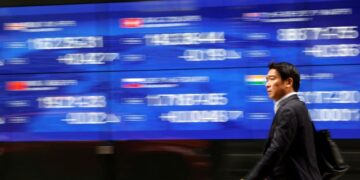(Reuters) – President Donald Trump said on Wednesday he would impose a 10% baseline tariff on all imports to the United States and higher duties on some of the country’s biggest trading partners, a move that could escalate a trade war and upend the global economy.
Trading partners are expected to respond with countermeasures that could lead to dramatically higher prices for everything from bicycles to wine.
Trump has already imposed 25% levies on autos and car parts.
Here are latest reactions from company executives, trade and labour associations:
COMPANIES
ANTONIO BARAVALLE, CEO, LAVAZZA
“We had already planned to increase (local production in the U.S.) to 100%.”
“We are ready to go … but now there is this other element that is to be investigated, the duties for Brasil … If they put a 10% duty on Brazil, the duty (of 20%) is somehow already halved.”
The coffee maker currently produces around 50% of what it sells in the U.S. locally.
FERRARI
“Purchase contracts for Ferraris have clear and standard clauses allowing the company to adjust prices in case trade conditions change before the vehicle’s delivery.”
New tariffs will also apply to Ferrari cars ordered months ago but not yet delivered to the U.S., a company spokesperson said.
MOTOFUMI SHITARA, CEO, YAMAHA MOTOR
“Our exports would certainly be impacted. If these tariffs continue long-term, including for vehicles, we will need to respond by raising prices or reducing costs.”
“Once you flip the switch … it’s very difficult to go back. So making a decision and figuring out how to manage this is something that each company will be very nervous about.”
SHIPPING GROUP MAERSK
“We generally expect customers to be a bit more cautious about their inventory levels. In the very short term, we’re likely to see some rush air freight orders in the U.S. ahead of the announced tariffs going into effect. It is also likely we will see an increase in demand for bonded storage as customers will want to hold off clearing goods while they get more certainty.”
PACKAGING AND MEDICAL EQUIPMENT MAKE GERRESHEIMER
“The tariffs primarily affect our exports from our plant in Mexico to the U.S. These include injection vials, for example … We will pass these customs duties on to our clients as additional costs. If necessary and if the customs duties are to remain in place in the longer term, we will also be able to relocate capacities.”
“With our production network in the U.S., there are also business opportunities for us from pharmaceutical companies that increasingly want to produce and source locally in the U.S.”
MASSIMO BATTAINI, CEO, CABLE MAKER PRYSMIAN
“On first reaction, the announcement appears to have a positive impact on local production. The tariffs will be applied to finished products, and therefore removes the risk that U.S. production could have been undercut from abroad. With 30 factories across the U.S. and as the market leader we are best placed to strengthen our leadership position.”
ANDERS VINDEGG, HEAD OF MEDIA RELATIONS, ALUMINIUM PRODUCER HYDRO
“We are working actively both from Norway and in the EU in Brussels to inform and to work actively with the organisations and other measures that we’re a part of to leverage the importance of Norwegian aluminium to Europe.”
“We’re also using our network and have our people on the ground in the U.S. working hard in dialogue with the U.S. administration to understand the effects of the tariffs.”
NOBUHIRO TORII, PRESIDENT, SUNTORY
“We will produce and try to sell locally … That’s the key strategy with the tariffs.”
ASSOCIATIONS AND WORKERS
EU FARMING GROUP COPA-COGECA
“The introduction of additional tariffs threatens to disrupt global supply chains, drive up prices, and limit market access for farmers and agri-cooperatives on both sides of the Atlantic, with significant economic consequences for the agricultural sector.”
“Copa and Cogeca strongly urge EU and US policymakers to fully exhaust diplomatic efforts in the coming days. Both sides must work constructively to address grievances without jeopardizing existing trade benefits.”
ANTHONY BRUN, HEAD OF FRENCH COGNAC GROWERS ASSOCIATION UGVC
“One could have feared much higher tariffs, but this risk is not off the table and remains with a potential conflict over bourbon whiskey. We already face tariffs in China, now there are the U.S., and the consequences will be very very brutal to wine growers.”
ETHAN LANE, SENIOR VP OF GOVERNMENT AFFAIRS, NATIONAL CATTLEMEN’S BEEF ASSOCIATION (NCBA)
“President Trump is taking action to address numerous trade barriers that prevent consumers overseas from enjoying high-quality, wholesome American beef. NCBA will continue engaging with the White House to ensure fair treatment for America’s cattle producers around the world and optimize opportunities for exports abroad.”
SIGRID DE VRIES, DIRECTOR GENERAL, EUROPEAN AUTOMOBILE MANUFACTURERS’ ASSOCIATION (ACEA)
“European automakers are committed to being active in the U.S., making an important contribution to the U.S. economy, accounting for around half a million jobs across the auto sector, exporting over 750,000 vehicles to the U.S. in 2024, and actively investing in local communities to foster economic prosperity.”
“We urge our leaders to meet urgently so that they can find a solution to any issues preventing free and fair trade between historic allies and allow the EU-US relationship to flourish once again.”
SWISS BUSINESS GROUP ECONOMIESUISSE
“A further escalation of the trade conflict must be prevented. The Federal Council and Swiss economic diplomacy are called upon to quickly find solutions at the negotiating table with the U.S. government. From an economic perspective, there are no comprehensible reasons for U.S. tariffs against Switzerland – quite the opposite.”
DIRK JANDURA, HEAD OF GERMANY’S EXPORTERS’ ASSOCIATION BGA
“We will have to pass these tariffs on as price increases, and that will hit turnover in many cases … This is an economic blind alley at whose end lie welfare losses for both sides of the Atlantic.”
WOLFGANG NIEDERMARK, EXECUTIVE BOARD MEMBER, GERMANY’S MAIN INDUSTRY ASSOCIATION BDI
“The justification for this protectionist escalation is incomprehensible. It threatens our export-oriented companies and endangers prosperity, stability, jobs, innovation and investment worldwide.”
“The EU must now strengthen its alliances with other major trading partners and should coordinate its response with them. A coordinated response is also needed to counter changed flows in international trade.”
(Reporting by Juby Babu in Mexico City, Vallari Srivastava, Neil Kanatt, Shivansh Tiwary, Mrinalika Roy, Unnamalai L, Jaspreet Singh and Dhanush Babu in Bengaluru, Abhirup Roy in San Francisco, Nick Brown and Caroline Humer in New York, Greta Rosen Fondahn, Linda Pasquini and Alessandro Parodi in Gdansk; Editing by Sayantani Ghosh, Shounak Dasgupta, Alan Barona and Milla Nissi)

















